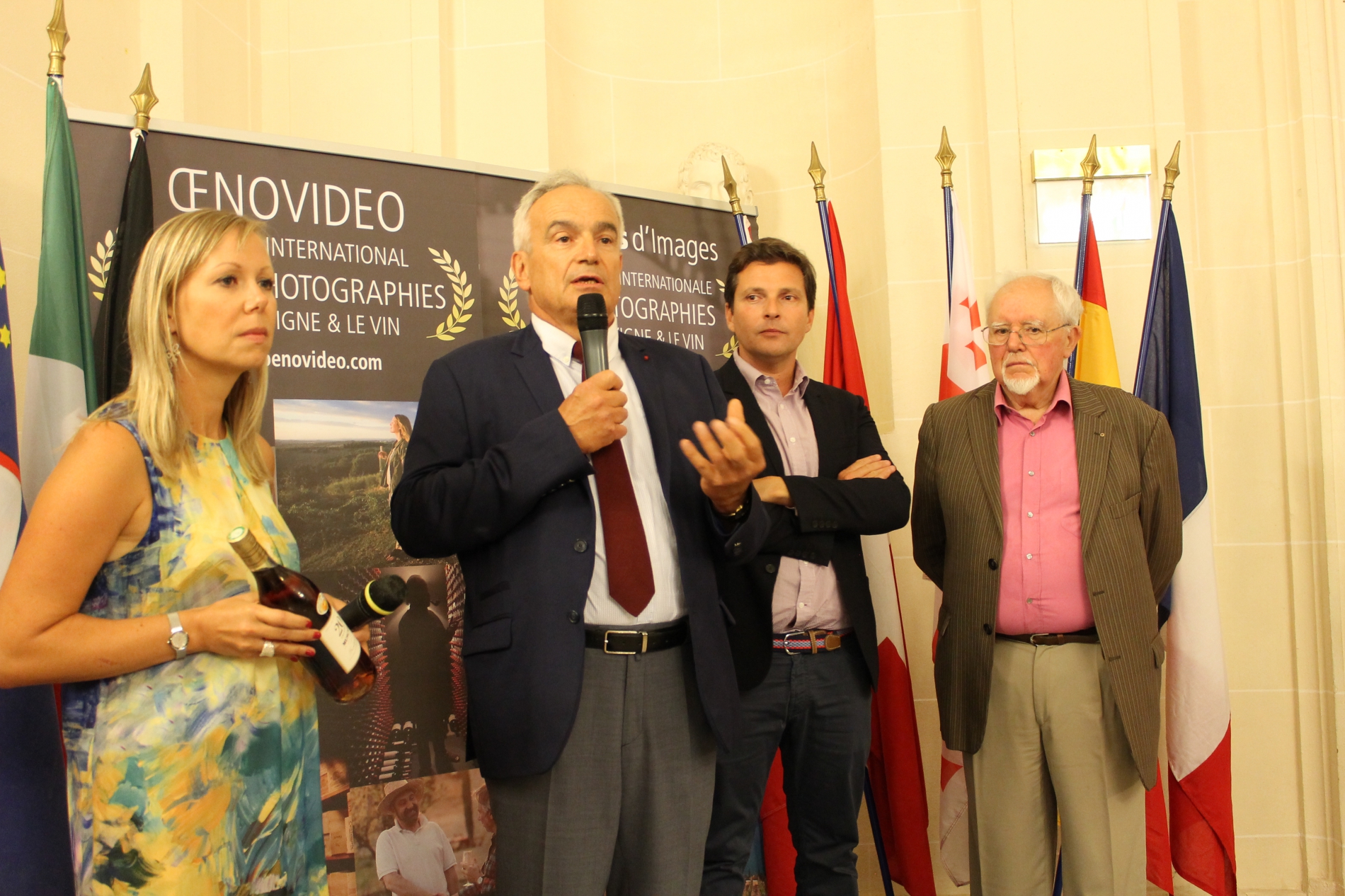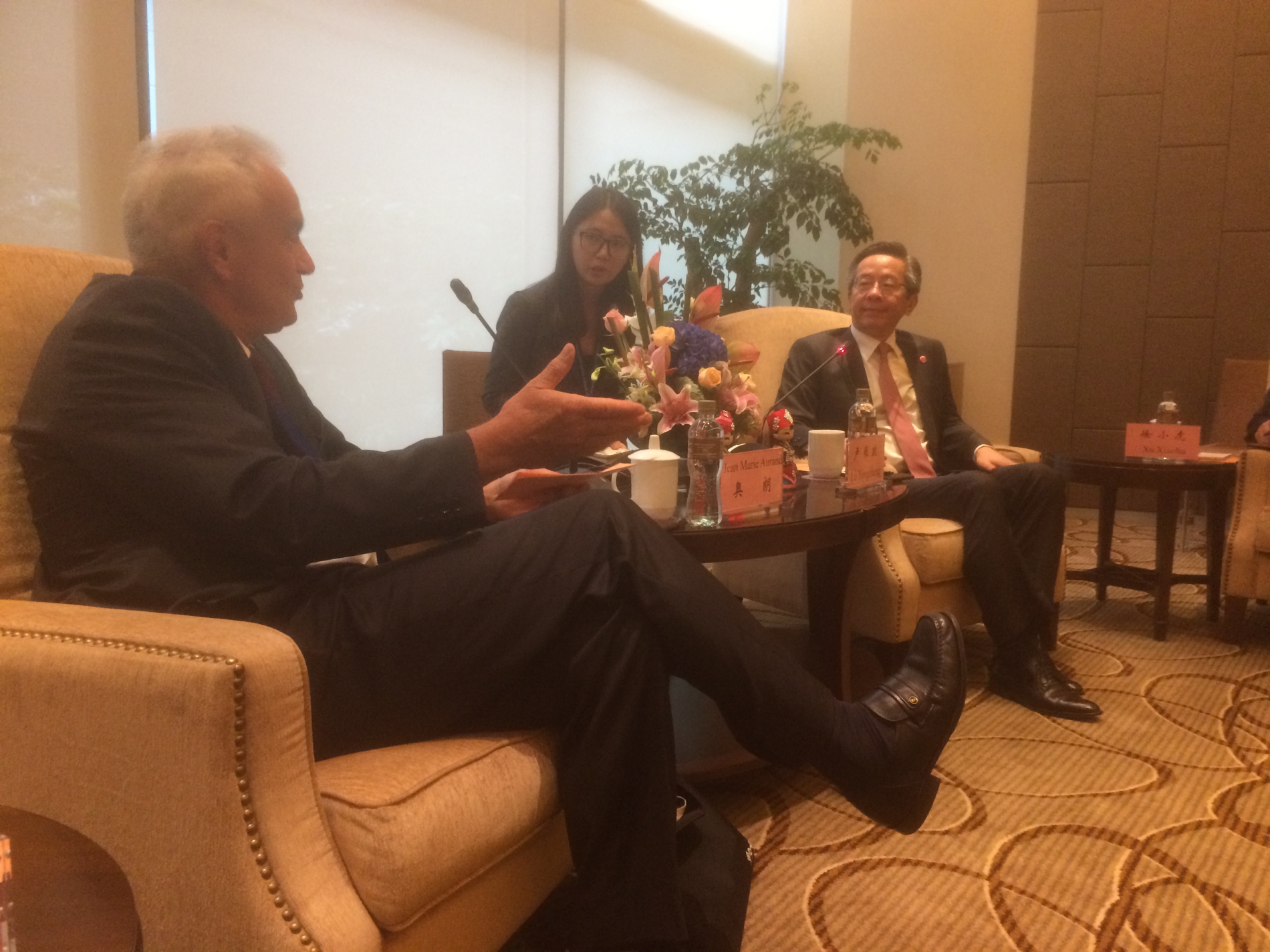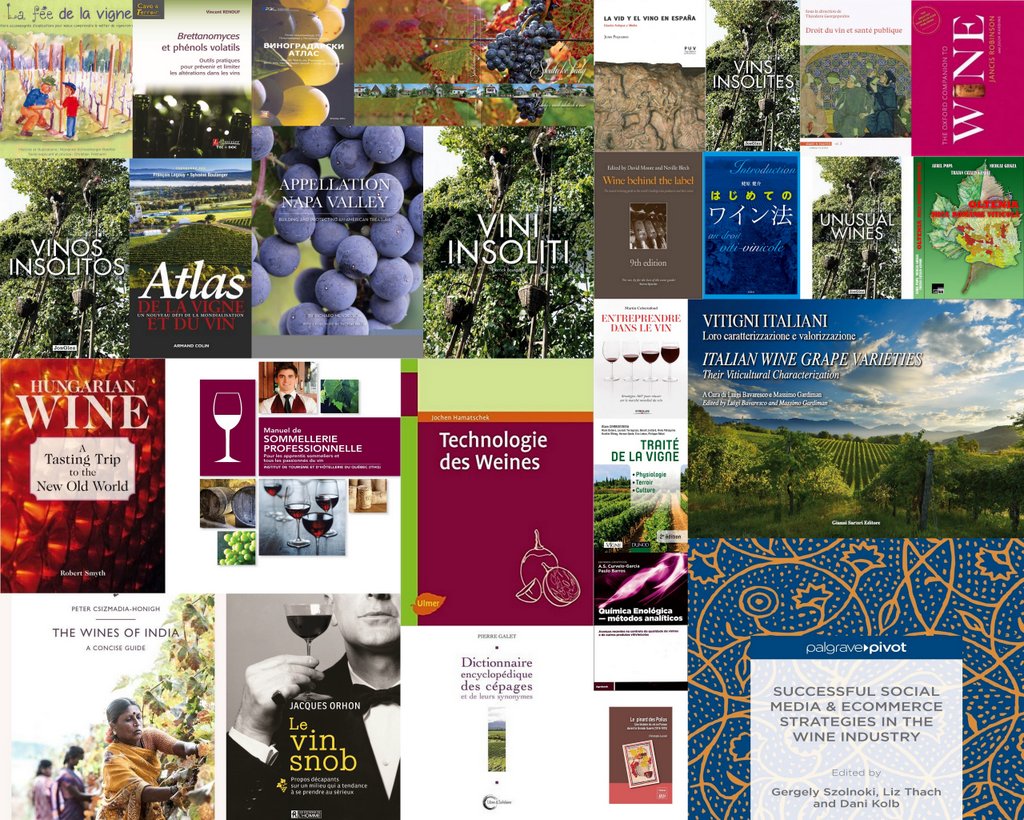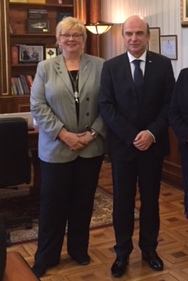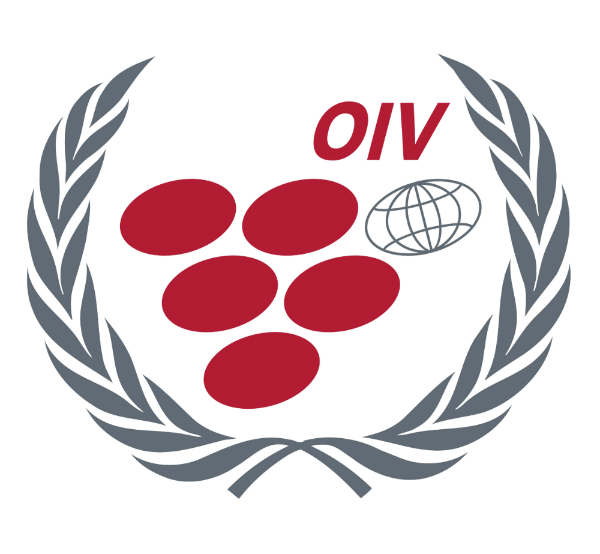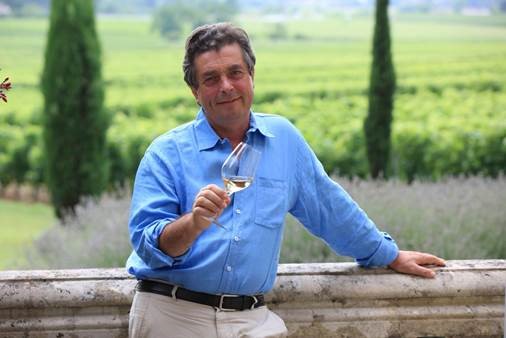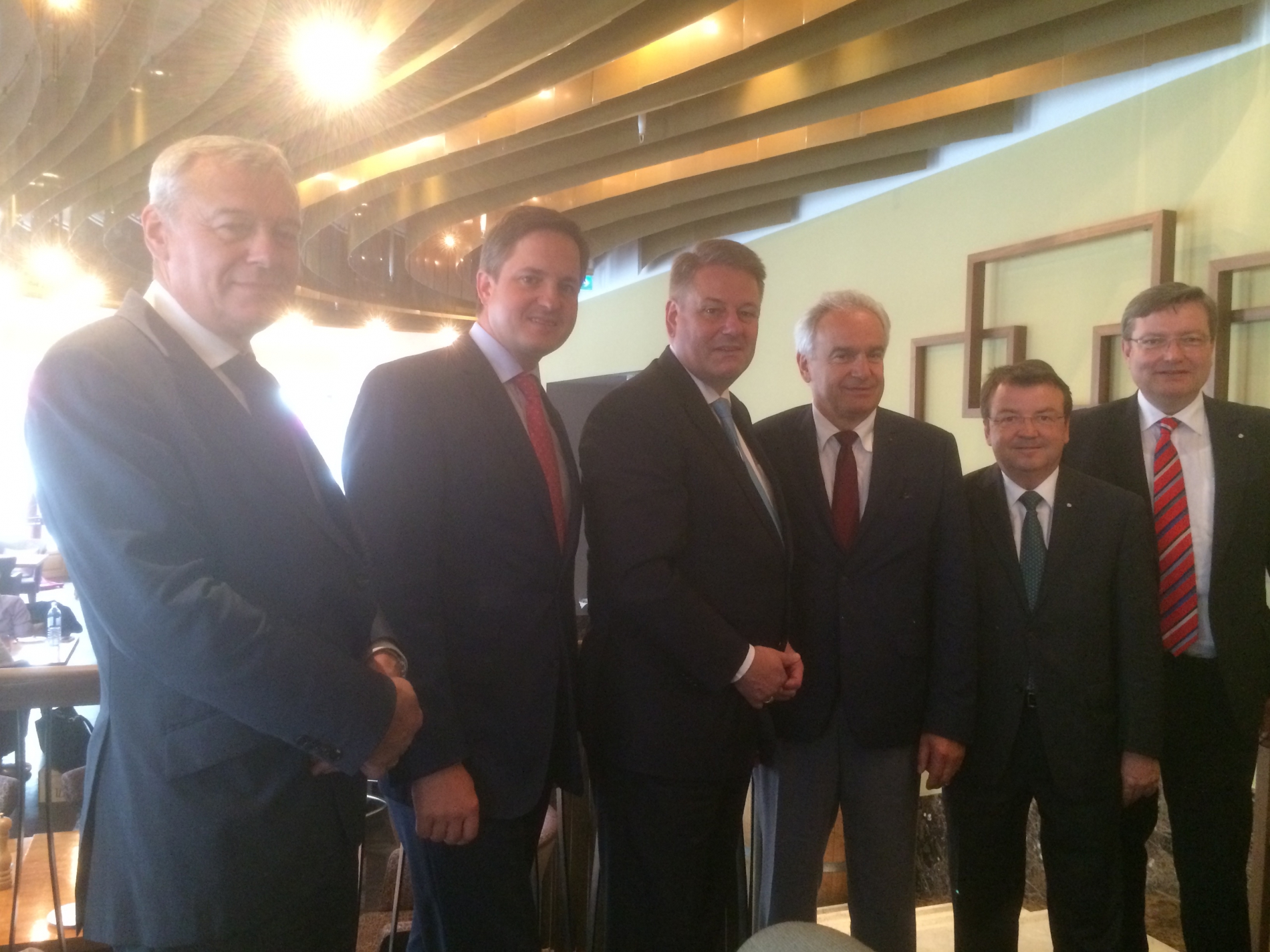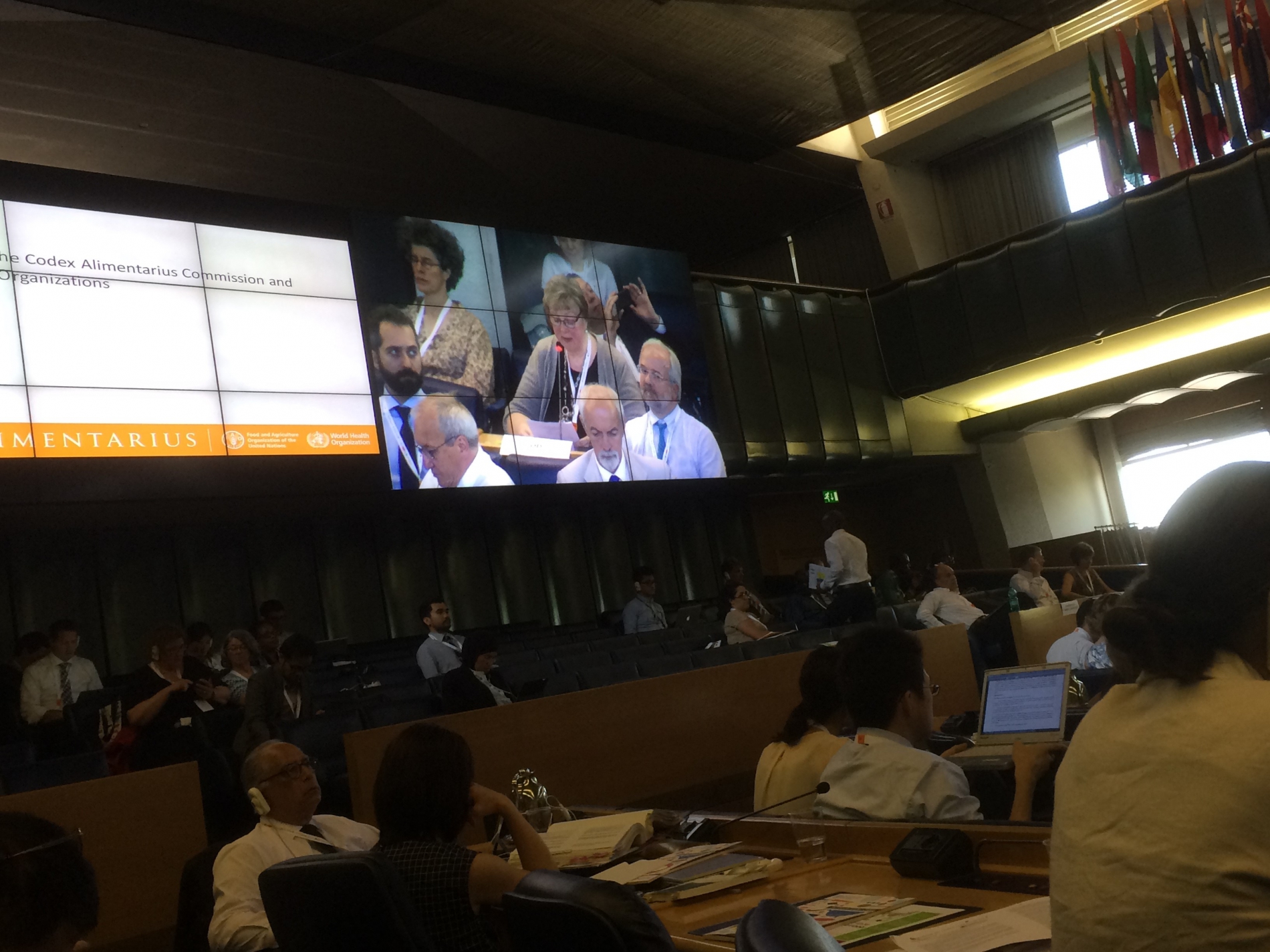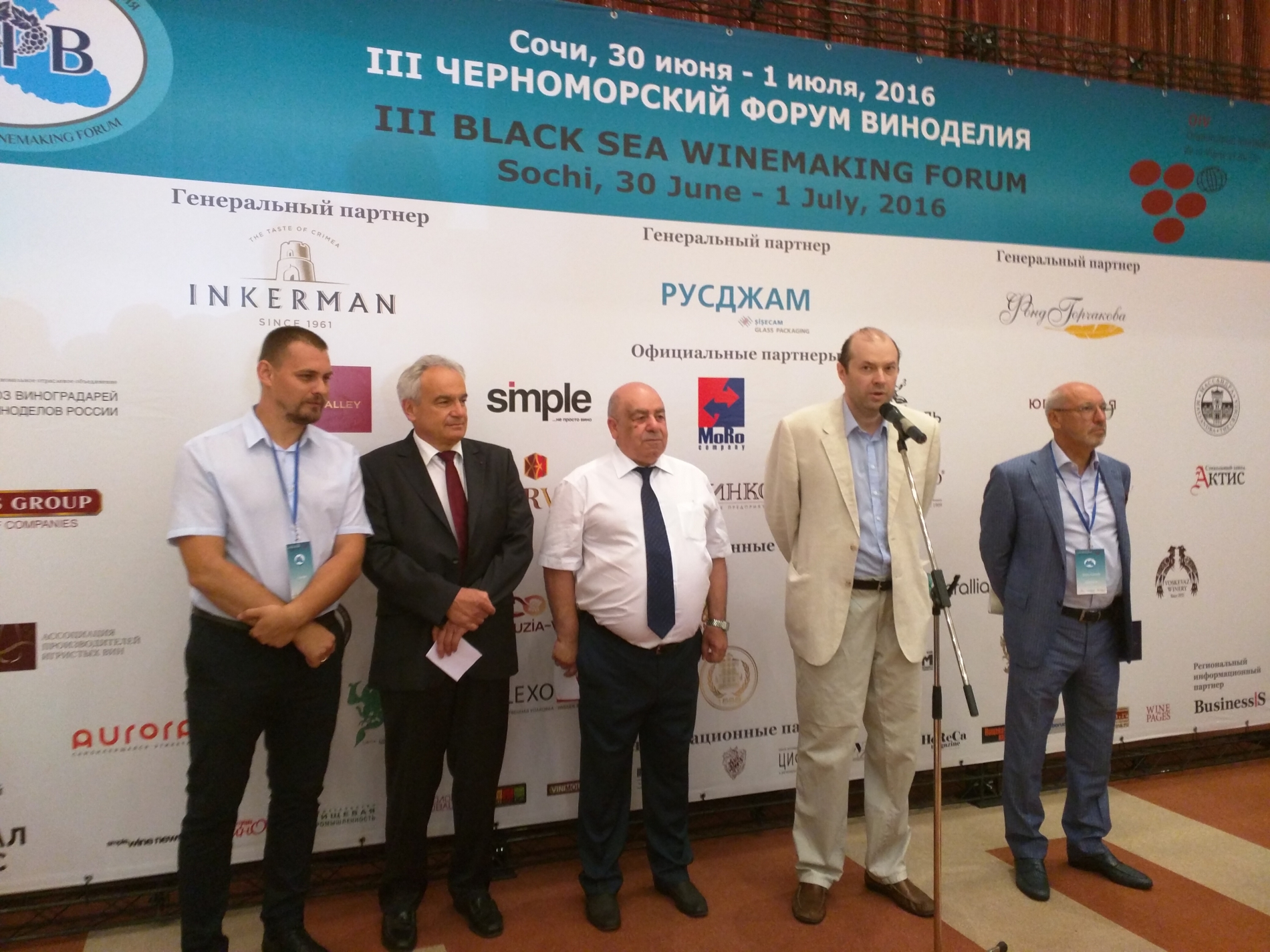19 Sep 2016
Under the patronage of the OIV, each year this festival recognises the best films and photographs relating to vines. Among the award winners of the 23rd festival, which took place at the end of May in Frontignan, are French, together with Canadian, Georgian and Slovenian productions. On the photographs side, the major winners of the 11th Terroir d'Images exhibition, which took place at the same time as the festival, were presented during this ceremony. See the Terroir d’Images Winners.The presentation of awards was also the moment for the handover from the town of Frontignan to the Cité du Vin (City of Wine) of Bordeaux, where the next festival will be held in 2017.
12 Sep 2016
This exhibition brought together representatives for 2000 exhibitors (700 of which were foreign) and hosted over 10 000 visitors.During a conference organised as part of the exhibition, Jean-Marie Aurand gave a panorama of the state of the global vitivinicultural sector, highlighting the major development trends and main issues for the future, as well as the role of the OIV in this context.At this event, the OIV Director General also partook in several meetings with representatives for the Chinese authorities, namely the Vice-Governor of Guizhou Province and the Chinese Vice-Minister for Commerce, with whom he brought up the prospects for the accession of China to the OIV.
24 Aug 2016
« Form_Inscription_Livre_Book_JdP_2017.pdf »: paper printed books and .pdf format (in the 10 categories) [FR / EN]« Form_Inscription_numeric_JdP_2017.pdf »: interactive digital format only in the first five categories : 1-Viticulture, 2-Œnology, 3-Vitivinicultural Economy and Law, 4-History, Literature and Fine Arts, 5-Wine and Health [FR / EN]
Rubric OIV Awards
22 Aug 2016
At this meeting, the Minister confirmed his intention to the President, expressed in January in Berlin during Green Week, to submit the candidacy of his country to the OIV.Ms Monika Christmann with Mr Edmond Panariti
31 Jul 2016
NEW for 2017:In addition to entries for works in paper and e-book format, interactive digital tools are accepted in the first 5 categories: 1-Viticulture, 2-Oenology, 3-Vitivinicultural Economy and Law, 4-History, Literature and Fine arts, 5-Wine and Health.Please note: journals and promotional and commercial documents are not accepted.A work (whether it has already won the award or not) may not be presented to the Award Jury for a second time.See details of the entries in the document "OIV Awards and Award Jury".
27 Jul 2016
The Professor dedicated his professional life to oenology. He served as Director of the Institute of Vine and Wine Sciences (ISVV) in Bordeaux (France). He was also the author of over 200 national and international works, publications and communications of a scientific and technical nature, and co-produced a Traité d'œnologie (Handbook of Enology), published by Dunod – which is a major reference today. Professor Dubourdieu was considered one of the top experts in winemaking and the maturing of white wines, and he will remain one of the greatest specialists in the science of wine and winemaking in the world. His passing is a great loss for the global vitivinicultural sector.The OIV pays tribute to the memory of this great oenologist and would like to extend its deepest sympathies to his family and friends.
15 Jul 2016
During a meeting with the Minister in the presence of Christian Jaborek and a number of senior Ministry officials, Jean-Marie Aurand praised the quality of relations between the Austrian authorities and the OIV and was delighted with their significant involvement at all levels. The Minister, emphasising the importance that his country attaches to the Organisation, confirmed his desire to maintain the active presence of his country in the different working structures.The possibility of organising a presentation of Austrian wines at the OIV in 2017 was envisaged. The visit led to a meeting with President Johannes Schmuckenschlager and Managing Director Josef Glatt of the Austrian Winegrowers' Association, as well as with the Managing Director of the Wine Marketing Board, Willi Klinger. The Director General was also hosted at the Federal College and Research Institute by its Director Reinhard Eder, who is also an OIV expert. Founded in 1980, the Institute plays a training role while also carrying out applied research in various vitiviniculture-related fields. Several researchers at the Institute participate in the work of the OIV. Finally, Jean-Marie Aurand visited a number of vineyards.Concentrated in the eastern part of the country, Austrian viticulture comprises nearly 25,000 estates, which produce 2.3 Mhl of wine per year. Austria has a long vitivinicultural tradition: vines have been grown there for thousands of years. Vinification, essentially of white wine (2/3 of production), emphasises traditional vine varieties such as Grüner Veltliner, an emblematic variety. Over recent years, Austrian viticulture has taken a remarkable leap forward thanks to major investment in quality. Winegrowers have used their strong talents to successfully reconcile tradition and modernity, which explains their success.
06 Jul 2016
The 2016 event was a vintage year in terms of the quality of the competing works. 27 countries were represented during registrations: a record since the OIV Awards were created.Furthermore, as an exceptional measure, the OIV Grand Prix award went to both Pierre Galet as well as Jancis Robinson for their contribution to the dissemination of knowledge of the wine sector and in acknowledgement of their internationally recognised work.
The 2016 OIV Grand PrixTo Pierre Galet for all of his work and the book representing his career as an author:Dictionnaire encyclopédique des cépages et de leurs synonymesAuthor: Pierre GaletPublisher: Libre & SolidaireCountry: FranceLanguage: French1200 pagesFormat: 21 x 24 cmTo Jancis Robinson for all of her work and the book representing her career as an author:The Oxford Companion to WineAuthor: Jancis Robinson assisted by Julia HardingPublisher: Oxford University PressCountry: United KingdomLanguage: English908 pagesFormat: 27.6 x 21.9 cm
The 2016 OIV AwardsCategory 1: ViticultureVitigni Italiani. Loro caratterizzazione e valorizzazione - Italian wine grape varieties. Their viticultural characterizationAuthors and coordinators of the group of 50 authors:Luigi Bavaresco and Massimo GardimanPublisher: Gianni Sartori EditoreCountry: ItalyLanguages: Italian and English231 pagesFormat: 21 x 30 cmCategory 2: OenologyQuímica Enológica - métodos analíticos. Avanços recentes no controlo da qualidade dos vinhos e de outros produtos vitivinícolasScientific Director of the group of 31 authors: António Sérgio Curvelo-Garcia Scientific Co-Director of the group of 31 authors: Paulo BarrosPublisher: Agrobook – editorial team: AGROTEC / Antonio Sergio Curvelo-Garcia and Paulo BarrosCountry: PortugalLanguage: Portuguese823 pagesFormat: 24 x 19 cm&Technologie des WeinesAuthor: Jochen HamatschekPublisher: Verlag Eugen UlmerCountry: GermanyLanguage: German478 pagesFormat: 17 x 23.5 cmCategory 3: Economy and LawAppellation Napa Valley: Building and Protecting an American TreasureAuthor: Richard MendelsonPublisher: Val de Grace Books & Film, INC.Country: United StatesLanguage: English261 pagesFormat: 30.5 x 22.9 cmCategory 3: Lawはじめてのワイン法 (Hajimete-no-wain-ho)Author: Kensuké EbiharaPublisher: Kohyusha. co., Ltd.Country: JapanLanguage: Japanese + PDF368 pagesFormat: 12.7 x 18.8 cmCategory 4: LiteratureLe vin snobAuthor: Jacques OrhonPublisher: Les Editions de l'HOMMECountry: CanadaLanguage: French264 pagesFormat: 15 x 23 cmCategory 4: HistoryLe pinard des Poilus. Une histoire du vin en France durant la grande Guerre (1914-1918)Author: Christophe LucandPublisher: EUD - Editions Universitaires de DijonCountry: FranceLanguage: French170 pagesFormat: 15 x 23 cmCategory 6: Discovering and Presenting WinesAtlas de la vigne et du vin - Un nouveau défi de la mondialisationCoordinator of the group of authors: François Legouy and Sylvaine BoulangerPublisher: Armand ColinCountry: FranceLanguage: French176 pagesFormat: 21 X 29.7 cmCategory 7: Wines and TerritoriesVins insolites - Unusual wines - Vinos insolitos - Vini insolitiAuthor: Pierrick BourgaultPublisher: Editions JonGlezCountry: FranceLanguage: Published in French, Italian, Spanish and English256 pagesFormat: 17.5 x 28.4 cm&The Wines of India - A Concise GuideAuthor: Peter Csizmadia-HonighPublisher: The Press Publishing LtdCountry: IndiaLanguage: English452 pagesFormat: 18.9 x 24.6 cmCategory 9: Monographs VINOGRADARSKI ATLASAuthors: Dragoslav Ivanišević, Darko Jakšić and Nada KoraćPublisher: Statistical Office of the Republic of SerbiaCountry: SerbiaLanguage: Serbian413 pagesFormat: 21 X 29.5 cmCategory 10: Symposia proceedingsDroit du vin et santé publique - Wine law and public healthDirector of the group of authors: Théodore GeorgopoulosPublisher: Les Éditions Mare & MartinCountry: FranceLanguage: French and English277 pagesFormat: 21 x 15 cm
The 2016 OIV Special MentionsCategory 1: ViticultureTraité de la vigneCoordinator of the group of eight authors: Alain CarbonneauPublisher: Editions DunodCountry: FranceLanguage: French592 pagesFormat: 17 x 24 cmCategory 2: OenologyBrettanomyces et phénols volatils - Outils pratiques pour prévenir et limiter les altérations dans les vinsAuthor: Vincent RenoufPublisher: LavoisierCountry: FranceLanguage: French264 pagesFormat: 15 x 24 cmCategory 3: Economy Successful social media and ecommerce strategies in the wine industryAuthors: Gergely Szolnoki, Liz Thach and Dani KolbPublisher: Palgrave MacmillanCountry: United StatesLanguage: English146 pagesFormat: 14 x 22 cm&Entreprendre dans le vinAuthor: Martin CubertafondPublisher: Editions EyrollesCountry: FranceLanguage: French290 pagesFormat: 17 x 24 cmCategory 4: HistoryLa vid y el vino en España. Edades antigua y mediaAuthor: Juan Piqueras HabaPublisher: PUV (Publicacions Universitat Valencia)Country: SpainLanguage: Spanish466 pagesFormat: 17 x 24 cmCategory 6: Discovering and Presenting WinesWine behind the label - 9th editionAuthors: David Moore and Neville BlechPublisher: Wine Behind The LabelCountry: United KingdomLanguage: English936 pagesFormat: 28 x 21.6 cm&La fée de la vigneAuthor of the texts: Christian FellmannWatercolour Illustrator: Marianne Schneeberger-BaehlerPublisher: Association Aquarelle à la carteCountry: SwitzerlandLanguage: French50 pagesFormat: 25 x 21 cmCategory 7: Wines and TerritoriesSkalické búdy - príbehy o vinohradníkoch a víneAuthor: Pavol DinkaPublisher: Vydavateľstvo Spolku slovenských spisovateľov BratislavaCountry: SlovakiaLanguage: Slovak567 pagesFormat: 31 x 28 cm&Hungarian Wine: a Tasting Trip to the New Old WorldAuthor: Robert SmythPublisher: BlueguidesCountry: HungaryLanguage: English351 pagesFormat: 14.8 x 21 cmCategory 8: Wines and GastronomyBožská Réva - Kniha plná vínaAuthor: Barbara MyšičkováPublisher: DivinemenuCountry: Czech RepublicLanguage: Czech370 pagesFormat: 23 x 23 cmCategory 9: Monographs Oltenia mica Românie viticolăAuthors: Aurel Popa, Nicolae Giugea and Traian Cătălin GenoiuPublisher: AIUSCountry: RomaniaLanguage: Romanian343 pagesFormat: 24.5 x 17.5 cmCategory 9: Monographs and Specialised StudiesLes outils de la vigne et du vin - Voyage à travers l'histoire du vin et de ses métiersAuthor: Stéphane BernoudPublisher: DunodCountry: FranceLanguage: French252 pagesFormat: 24 x 32 cmCategory 10: EncyclopaediasManuel de sommellerie professionnelleAuthors: Pascal Patron, Kathleen McNeil and Jean-Luc JaultPublisher: Institut de tourisme et d'hôtellerie du QuébecCountry: CanadaLanguage: French754 pagesFormat: 21.2 X 27.5 cm
04 Jul 2016
Before 123 Member States of the Codex Alimentarius, and within the framework of relations between the Codex Alimentarius Commission and other international organisations, Monika Christmann emphasised that the OIV was participating in several Codex projects under way and that it was actively involved, particularly in discussions concerning the provisions relative to food additives that appear in the General Standard for Food Additives (GSFA). She insisted on the need to ensure consistency between the GSFA provisions on food additives used for grape wines and OIV recommendations. Furthermore, she declared that the OIV was looking to collaborate closely with the Codex, as well as with the Joint FAO/WHO Expert Committee on Food Additives (JECFA), in order to avoid the duplication of work and the establishment of divergent international standards – given that a number of references to Codex standards have already been included in OIV documents. Monika Christmann also signalled that the OIV was continuing its active collaboration with the FAO for the purposes of developing global statistics on the vitivinicultural sector.The OIV President concluded that it was necessary to pursue cooperation and coordination with regard to activities of common interest to the OIV and the Codex. Download the document concerning the OIV communication [FR] [EN]
01 Jul 2016
Placed under the patronage of the OIV, this event was put on within the framework of the Organization of the Black Sea Economic Cooperation (BSEC), of which Russia assumed the chairmanship in 2016.It gathered together around 150 actors in the vitivinicultural sector and wine producers – with distributors, oenologists and sommeliers from 10 or so countries.During a conference organised on the theme of prospects for cooperation (both technical and economic) in the vitivinicultural sector all around the Black Sea region, the Director General of the OIV, Jean-Marie Aurand, gave a presentation of the major trends in vitiviniculture on a global scale – with a particular focus on the main developments in consumption and its recent evolutions.The third Black Sea Winemaking ForumA presentation of wines organised as part of the forum brought together around 60 companies.
